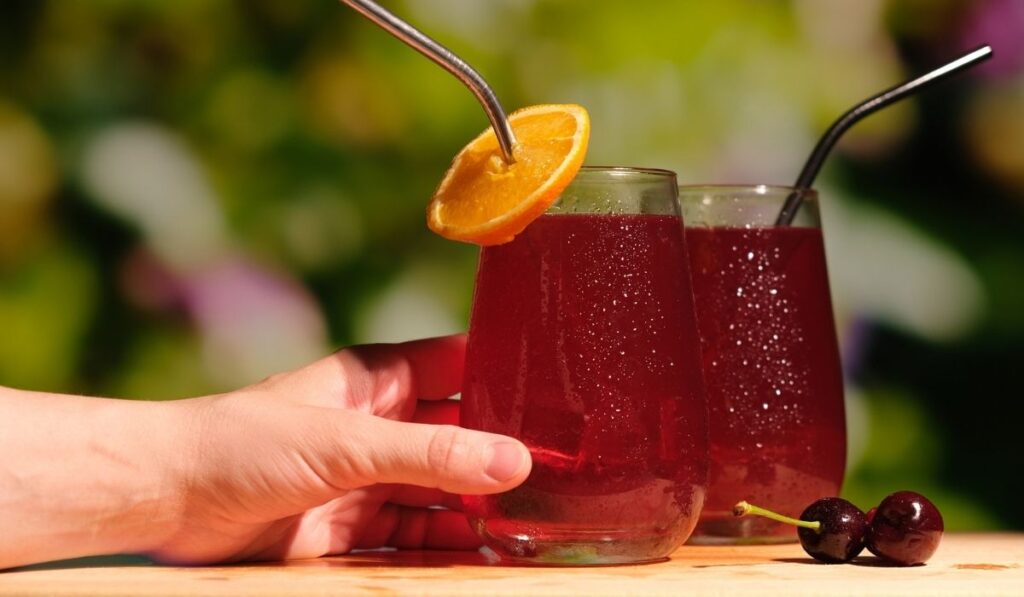We all know that heavy alcohol consumption can come with an array of not-so-great consequences. Usually the hangover is the thing that you’re most worried about, but how does moderate drinking affect your teeth and oral hygeine?
Moderate alcohol use can result in teeth stains, dry mouth, and erosion of enamel, which exposes the teeth to bacteria and makes them more sensitive. Using a straw, rinsing with water between drinks, and favoring lighter-colored drinks are just a few ways to reduce the effects of alcohol on teeth.
Practicing good oral hygiene is crucial to your health, no matter how much you’re drinking. But even the light drinker can take certain precautions while they’re out on the town. So, what can you do to prevent damage to your teeth? Read on for guidance and tips.
How Does Alcohol Damage Your Teeth?

Heavy alcohol consumption can lead to gum disease, tooth decay, and mouth sores. We often consider these adverse effects of alcohol to be reserved for those who drink excessively. However, even moderate and light alcohol consumption can have a negative effect on your teeth.
Some of the potential issues that can result from drinking alcohol include:
- Weakened Teeth Enamel: Like other sugary and acidic beverages, alcohol can damage your tooth enamel. Acidic drinks can weaken, soften, and erode the enamel over time. Loss of tooth enamel can, in turn, result in increased tooth sensitivity and other health complications.
- Staining: The different colors of alcohol come from chromogens. These chromogens attach to teeth enamel, staining them in the process. Dark-colored liquors like bourbon and red wine are much more likely to leave stains on your teeth.
- Dry Mouth: Alcohol dries out your mouth. When your mouth is dry, you’re at a higher risk of developing cavities, plaque build-up, and exposure to harmful bacteria. All of this can result in dental decay, gum disease, and other issues.
- Gum Disease: As we mentioned earlier, excessive alcohol consumption can cause gum disease. The sugars in alcohol can contribute to the build-up of harmful oral bacteria. This bacteria can lead to bleeding, bad breath, and more.
How to Protect Your Teeth While Drinking Alcohol
So, what if you’re a moderate drinker wants to keep an eye out on their oral health? How exactly can you protect your teeth while drinking alcohol? Fortunately, there are many ways to practice good oral hygiene while consuming alcohol:
- Consider Switching to Light Colored Drinks: If you prefer red wine or dark-colored spirits, you may want to consider switching to lighter options. Alcoholic beverages with more of a golden or clear color are less likely to stain your teeth.
- Use a Straw: Using a straw is one way to prevent damage to your teeth. This is because straws help keep sugary and acidic beverages from hitting your teeth directly.
- Avoid Sugars, Sweeteners, and Mixers: Drinks with a high amount of sugars, sweeteners, and mixers may cause more damage than those without. The acidity and sugar found in sweet drinks can weaken, soften, and erode tooth enamel over time. Weakened tooth enamel can lead to sensitivity and even tooth decay.
- Rinse Between Drinks: Try swishing a bit of water around in your mouth the next time you’re drinking. Rinsing out your mouth with water between drinks helps reduce the bacteria and acidity in your mouth. Doing this is an easy way to protect your teeth while drinking alcohol.
- Beer Might Be Better: Although beer can still cause oral damage, it may be preferable than wine. Beer is less acidic than wine, so it causes less damage. However, the dark barley and malts in beer can still stain your teeth.
- Brush Regularly: The best way to prevent oral damage is to brush your teeth regularly. Consistently brushing and flossing will help protect your teeth for the long run.
Avoid brushing right after you have a drink. Brushing right after your teeth have been softened from the acidity of a drink only adds to the erosion.
For the best results, wait at least half an hour before brushing your teeth and use a soft-bristled toothbrush, like the Colgate 360 Extra Soft Toothbrush (on Amazon).
Should Moderate Drinkers Be Worried About Their Teeth?

We know heavy alcohol consumption can lead to a handful of medical problems, including gum disease, cancer, and dental decay. But does the moderate drinker also need to be worried about these more serious complications?
Although the science is inconclusive, moderate drinkers are probably not at a significant risk for gum disease and oral cancer. However, dentists do see the effects of alcohol on moderate drinkers’ teeth. Stains, weakened enamel, and increased bacteria growth are all tangible risks for the average drinker.
Fortunately, there are ways you can prevent damage. Using a straw, switching to lighter drinks, and rinsing with water between beverages are just a few ways to avoid oral damage.
As always, speak with your dentist before making any major changes to your dental care or if you have more questions.


